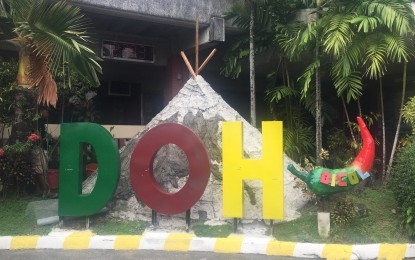
The Department of Health- Bicol office in Legazpi City. (PNA file photo)
LEGAZPI CITY -- The Department of Health (DOH) regional office here is urging Bicolanos to observe preventive measures against meningococcemia.
Dr. Lulu Santiago-Ramos, Emerging and Reemerging Infectious Diseases coordinator of the Center for Health Development-Bicol, on Wednesday reminded the region's residents to boost their immune system by living a healthy lifestyle, including eating healthy foods, cleaning the environment, and observing proper hygiene.
"Because of the severity and rapid progression of the disease, early diagnosis and immediate treatment is needed," she said.
Ramos said meningococcemia can spread from person-to-person through exchange of respiratory and throat secretions particularly from coughing, kissing, or sharing of utensils.
"However, this disease does not spread as easily as common colds or influenza as the bacteria causing the disease cannot survive outside of the human host," Ramos added.
She said a person is only at risk when there is direct contact with the infected person, that is why it is important to avoid being close to meningococcemia patients and going to crowded places, as much as possible.
If in a high-risk population, one is advised to be immunized with the Meningococcal Conjugate Vaccine which, however, is only available in private hospitals in Bicol.
“Mabilis lang talaga siya (Meningococcemia), pag positive na meron ka nito, pwede mag-cause ng death. Sa DOH, ginagawa natin lahat to prevent and control the spread of this disease pero kahit gaano kahirap ang ginagawa namin para maiwasan ito, kailangan pa rin natin magtulong-tulong, that’s why we urge everyone to do their part (It spreads rapidly. If a person is positive of it, it may cause death. That's why we at DOH do the best preventive and control measures. We need to help and urge everyone to do their part)," Ramos said.
She said early check-up and right medications are important in fighting meningococcemia.
Practice of good personal hygiene such as regular handwashing, and covering of mouth and nose when coughing or sneezing are also highly encouraged to prevent the spread of the meningococcal disease.
Meningococcemia is a rare, but very serious illness caused by a bacteria called Neisseria Meningitidis. It presents nonspecific signs and symptoms at first such as cough, headache, and sore throat, followed by upper respiratory symptoms, fever, chills, malaise, nausea, vomiting and skin rashes.
It can quickly progress and manifest with lethargy, difficulty in breathing, neck stiffness, sensitivity to light, seizures, hemorrhagic eruptions, purpuric and petechial skin lesions, and hypotension. (PNA)
